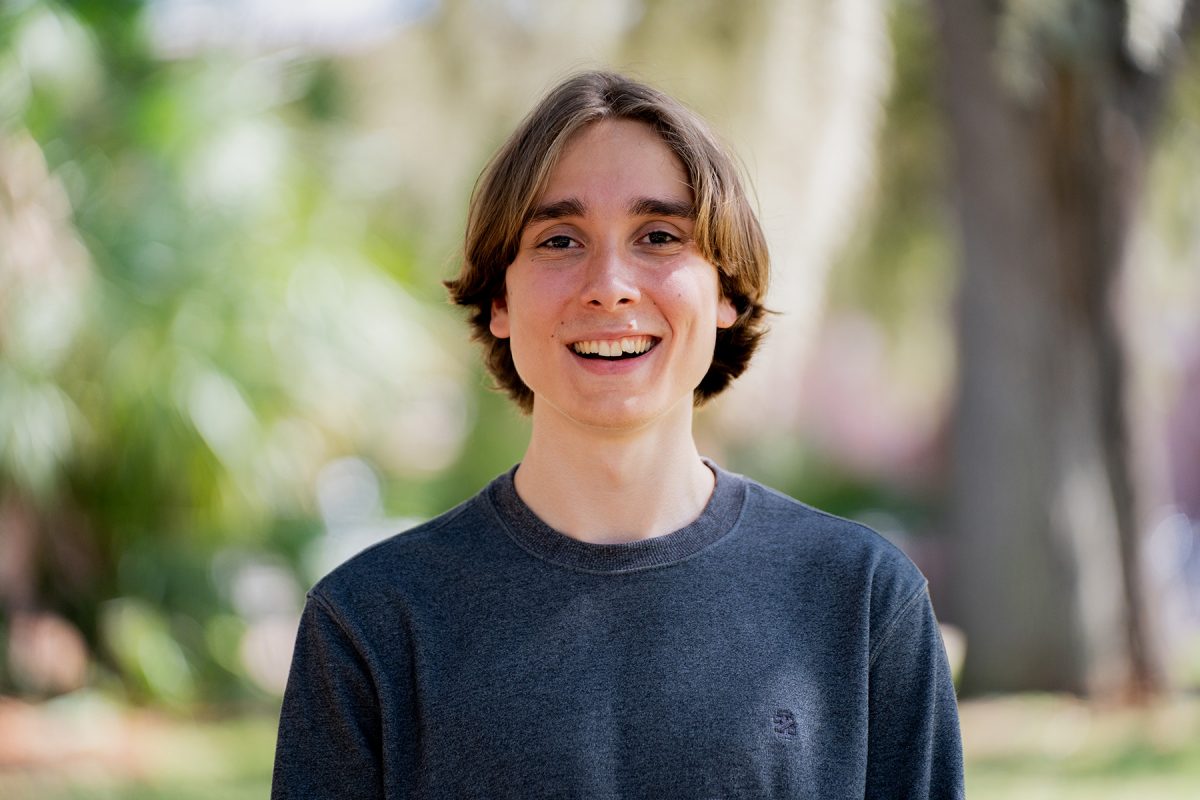
“I continue to enjoy being able to help people improve their confidence in challenging courses like organic chemistry.”
Fast Facts
- Athlete: Has been a member of Seminole Striders running club and FSU rock climbing club
- Homebody: Has never been outside of the U.S.
- Favorite study spot: William Johnston Building
- Vegan: Has been fully vegan for three years but was vegetarian before that
- Coder: Is learning how to code using Python
Tallahassee native Sequoia Ernst is dedicated to pursuing research and helping others on their academic journeys.
During his time at Florida State University, Ernst has been involved in many aspects of research and community service, from being an Academic Center for Excellence (ACE) tutor, to taking part in the Undergraduate Research Opportunity Program (UROP) and presenting at the Florida Undergraduate Research Conference.
Ernst and two of his lab partners won an IDEA grant to fund their research on nicotinamide adenine dinucleotide phosphate (NADPH) oxidase protein, a membrane-bound enzyme complex that creates reactive oxygen species which, in high concentrations, can contribute to heart disease. They studied how this protein affected blood flow in people with high body mass indexes.
He led a study group for Nikolay Tsvetkov’s organic chemistry class during which he found a passion for sharing his knowledge and helping other students.
Why did you choose to attend Florida State University?
I always assumed if I went to college, it would be FSU. I grew up in Tallahassee and my friends and peers all attended FSU. FSU was the only school I seriously applied to. I was homeschooled with a lenient style of teaching. This gave me a thirst for knowledge but left me academically behind my peers until I started taking college classes as a dual-enrolled student at Tallahassee State College. When I started FSU, I lacked confidence in my ability to succeed academically, and I’m glad I decided to come here. My professors at FSU have encouraged me and have seen the best in me.
What is your favorite academic scholarship experience you have had?
I helped with a study in Bob Hickner’s lab during the Fall 2023 and Spring 2024 semesters through UROP. I enjoyed my time in UROP and was rewarded for it in two main ways. First, I was able to use the data we generated to present a poster at the Florida Undergraduate Research Conference, an experience I loved. I hadn’t thought of undergraduate researchers as a community until this conference. I got to discuss my research with interested peers and heard exciting things other students were working on. Second, with the encouragement of one of Hickner’s Ph.D. students, two other undergraduates who were also working in the lab and I applied for and won an IDEA Grant to expand on the lab’s previous work. The project we proposed and have completed used micro dialysis and a drug that blocks activity of the NADPH oxidase protein to determine which harmful reactive oxygen species produced by NADPH oxidase reduce blood flow. We didn’t find a significant effect of NADPH oxidase activity on blood flow, but we did find that it’s associated with high levels of lactate. It was disappointing to find that our theory was not correct, but it was cool to see something unexpected that can inform future research.
How have you been able to contribute to your community at Florida State University?
During the Summer 2023 semester, I took organic chemistry with Nikolay Tsvetkov. Tsvetkov asks students who are doing well to lead open study groups where other students can come and ask questions. Because I had one of the top grades in the class, I became a study group leader. I loved this experience. It was a fun challenge every week trying to find the simplest way to explain difficult concepts. My last study group for the final exam had almost 40 people in it. I enjoyed this experience so much that I applied to become a tutor at FSU’s Academic Center for Excellence. I still work there and enjoy helping people improve their confidence in challenging courses like organic chemistry.
What advice would you give to incoming freshmen to make the most of their Florida State University experience?
One thing I regret from my freshman year is not reaching out to professors to get involved with their research. I would recommend for any incoming freshmen interested in research to email professors in their department. It can be daunting, but, in my experience, most professors will be happy to hear from a student. The worst they will say is that they’re not looking for new research assistants. Getting involved with research is a great way to enhance what you get out of college, and it sets you apart from other students.



